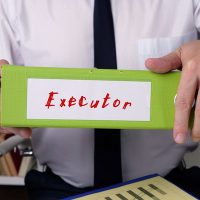What Does A Will Executor Do?

With a comprehensive estate plan, you may be able to avoid the probate process. However, many people are under the mistaken belief that so long as they have a will, they have a complete estate plan, and can avoid court. This is not true; if you only have a will, and your estate has assets that exceed $166,250, your estate will have to go through the probate process.
How the Process Starts
You will name an executor in the will; the executor will be the person that is responsible for making the decision whether or not probate is required (based of course on the law, and the advice of a probate attorney).
If probate is needed, the executor will file the probate action, and file your will with the court. Yes, your will is publicly published—one drawback of probate, and one reason why avoiding probate is often preferable.
The court will officially appoint the executor, so the executor can start his or her work. The executor will be given permission, in writing, from the court to handle the duties needed by the will and the court.
What the Executor Does
The overall duties in order for the executor are for the executor to value your property, inventory the property, handle claims that may be made or pending against any of your property, and, when that is all complete, inform the court that the property is ready for distribution to beneficiaries.
Legal notices of your passing must be published, either to find beneficiaries, or to notify creditors of potential claims against the estate.
While the court (probate) action is going on, the executor will manage the estate—he or she will pay bills, maintain property, account for all the property, and generally oversee everything, keeping it safe and accounted for. The executor will have to open a bank account in the name of the estate, to manage the estate’s assets and properties.
Your executor may need to value things that you own, and so the executor will need to hire an appraiser. Things like art, instruments, vintage cars, coins, comics—anything that may have value—may have to be appraised. Usually, the appraiser is one that is appointed by the probate court.
The executor will also notify the government of your passing, letting the IRS know, and the executor will take over and defend any claims that may be made against your estate.
When is it Done?
Usually, around 9 months after the initial filing, assuming all of this has been done, the executor can then tell the court that the property or assets are ready to be given to the named beneficiaries in the will.
Note that unexpected hurdles—like beneficiaries challenging the will, or co-owners of estate property, may need to be handled, which could delay distribution of estate assets.
This may all seem arduous; it can be, but doesn’t have to be. And, it can often be avoided with good estate planning in advance that can keep your estate away from the probate process entirely.
Call the Torrance will attorneys at Samuel Ford Law today to help you with the probate process or help you avoid it entirely.
Sources:
nolo.com/legal-encyclopedia/california-restrictions-who-can-serve-executor.html
scscourt.org/self_help/probate/property/probate_overview.shtml
